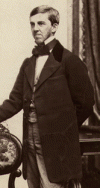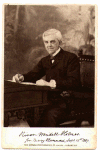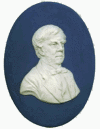|
HOLMES was born at Cambridge,
Massachusetts, August 29, 1809, and died October 7, 1894.

Oliver Wendell Holmes reading a paper before the Boston Society for
Medical Improvement in 1843.
At the age of twenty he graduated at
Harvard University, then took up the study of law. This study,
however, was soon abandoned for medicine. He studied in Europe for a
short time, and took his degree as doctor of medicine at Cambridge, in
1836. Two years later he was appointed to the chair of Anatomy and
Physiology in Dartmouth College. This position he held till 1847, when
he accepted a similar position at Harvard, which he held till 1892.
All of his literary work was performed in addition to the labors of a
continuous professorship in college of about forty-seven years.
Holmes' literary tastes were early indicated by his comic and satiric
verse contributed to "The Collegian." These were excellent of
their kind. In his early works, the mirth so often outweighed the
sentiment as to lessen the promise and the self-prediction of his
being a poet indeed. While many of his youthful stanzas are serious
and elegant, those which approach the feeling of true poetry are in
celebration of companionship and good cheer. He seemed to exemplify
what Emerson was wont to preach, that there is honest wisdom in song
and joy. He contributed numerous pieces to American periodicals, and
in 1836 collected his poems into a volume. His life was not marked by
any noted events, but it was like the steady movement of a great
river. It grew broader and deeper in each mile of its progress.
"Holmes was a shining instance of one who did solid work as a teacher
and practitioner, in spite of his success in literature." "Poetry,"
a metrical essay, was followed by "Terpsichore," a poem; in
1846, "Urania," in 1850, "Astreea," "The Balance of
Allusions," a poem. These poems were first delivered before
college and literary societies.
 Though
the most direct and obvious of the Cambridge group, the least
given to subtleties, he was our typical university poet; the minstrel
of the college that bred him, and within whose liberties he taught,
jested, sung, and toasted, from boyhood to what in common folk would
be old age. Alma Mater was more to him than to Lowell or Longfellow,
and not until he came into her estate could Harvard boast a natural
songster as her laureate. Two centuries of acclimation, and some
experience of liberty, probably were needed to germinate the fancy
that riots in his measures. Before his day, moreover, the sons of the
Puritans hardly were ripe for the doctrine that there is a time to
laugh, that humor is quite as helpful a constituent of life as gravity
or gloom. Provincial-wise, they at first had to receive this in its
cruder form, and relished heartily the broad fun of Holmes' youthful
verse. Their mirth-maker soon perceived that both fun and feeling are
heightened when combined. The poet of 'The Last Leaf' was among
the first to teach his countrymen that pathos is an equal part of true
humor; that sorrow is lightened by jest, and jest redeemed from
coarseness by emotion, under most conditions of this our evanescent
human life." Though
the most direct and obvious of the Cambridge group, the least
given to subtleties, he was our typical university poet; the minstrel
of the college that bred him, and within whose liberties he taught,
jested, sung, and toasted, from boyhood to what in common folk would
be old age. Alma Mater was more to him than to Lowell or Longfellow,
and not until he came into her estate could Harvard boast a natural
songster as her laureate. Two centuries of acclimation, and some
experience of liberty, probably were needed to germinate the fancy
that riots in his measures. Before his day, moreover, the sons of the
Puritans hardly were ripe for the doctrine that there is a time to
laugh, that humor is quite as helpful a constituent of life as gravity
or gloom. Provincial-wise, they at first had to receive this in its
cruder form, and relished heartily the broad fun of Holmes' youthful
verse. Their mirth-maker soon perceived that both fun and feeling are
heightened when combined. The poet of 'The Last Leaf' was among
the first to teach his countrymen that pathos is an equal part of true
humor; that sorrow is lightened by jest, and jest redeemed from
coarseness by emotion, under most conditions of this our evanescent
human life."
|
Turning his attention to prose, he
published, in 1858, "The Autocrat of the Breakfast Table," a
series of light and genial essays full of fancy and humor, which has
been successful both in the New and Old World. It appears that this work
was planned in his youth; but we owe to his maturity the experience,
drollery, proverbial humor, and suggestion that flow at ease through its
pages. Little was too high or too low for the comment of this down-east
philosopher. A kind of attenuated Franklin, he viewed things and folks
with the less robustness, but with keener distinction and insight. His
pertinent maxims are so frequent that it seems, as was said of Emerson,
as if he had jotted them down from time to time and here first brought
them to application; they are apothegms of common life and action, often
of mental experience, strung together by a device to original as to make
the work quite a novelty in literature. The Autocrat holds an
intellectual tourney at a boarding-house table; there, jousts against
humbug and stupidity, gives light touches of knowledge, sentiment,
illustration, coins here and there a phrase destined to be long current,
nor forgets the poetic duty of providing a little idyl of human love and
interest.
This was followed by "The Professor at the Breakfast Table," and
later by "The Poet at the Breakfast Table." "The Professor"
is written somewhat in the manner of Sterne, yet without much artifice.
The story of Iris is an interwoven thread of gold. The poems in this
book are inferior to those of the Autocrat, but its author here and
there shows a gift of drawing real characters; the episode of the Little
Gentleman is itself a poem,--its close very touching, though imitated
from the death scene in Tristram Shandy. "The Poet at the Breakfast
Table," written some years after, is of a more serious cast than its
predecessors, chiefly devoted to Holmes' peculiar mental speculations
and his fluent gossip on books and learning. He makes his rare old
pundit a liberal thinker, clearly of the notion that a high scholarship
leads to broader views.
Between the second and third of the "Autocrat" series, appeared,
in 1861, "Elsie Venner," and in 1868, "The Guardian Angel,"
two excellent novels. Then, in 1872, he published "Mechanism in
Thought and Morals." He is also author of a valuable medical work,
and of numerous essays and poems of value.
When the civil war broke out, this conservative poet, who had taken
little part in the agitation that preceded it, shared in every way the
spirit and duties of the time. None of our poets wrote more stirring war
lyrics during the conflict; none was more national so far as loyalty, in
a Websterian sense, to our country and her emblem is concerned. He
always displayed the simple, instinctive patriotism of the American
minute-man. He may or may not have sided with his neighbors, but he was
for the nation. His pride was not of English, but of long American
descent.
Than Holmes, no one has written a greater number of short beautiful
poems, that are on every tongue. When a noted American ship was declared
unseaworthy, and about to be abandoned, our poet came forward with a
magnificent poem, entitled "Old Ironsides," that gave that fine
old ship a half century of preservation.
But he gave us some of the best thoughts. Many of his
sayings must stand among the finest specimens of American wit and humor;
and his writings, as a whole, will always be classed
 among the best of
their kind. In his prose works we are constantly delighted by the
frequent occurrence of the most brilliant and original thoughts. He will
always stand in the temple of American literature, among the most
brilliant and popular writers. among the best of
their kind. In his prose works we are constantly delighted by the
frequent occurrence of the most brilliant and original thoughts. He will
always stand in the temple of American literature, among the most
brilliant and popular writers.
An
autographed photograph of Oliver Wendell Holmes given to Mary Hammond,
September 15, 1887 |





